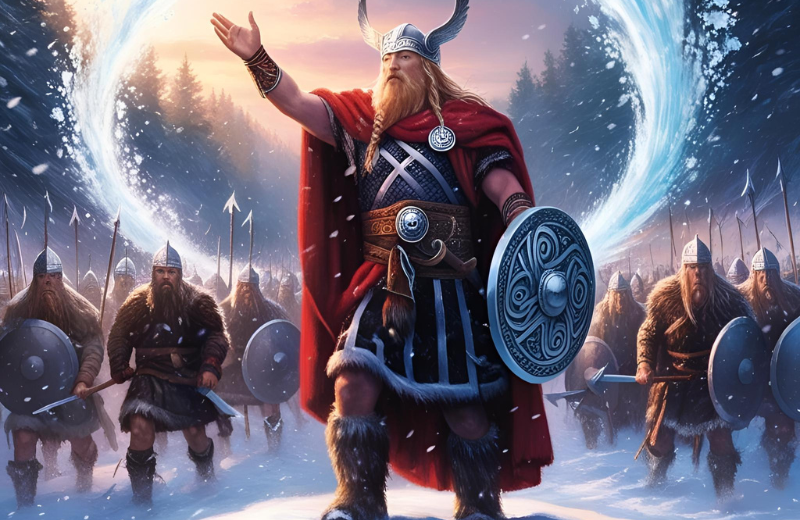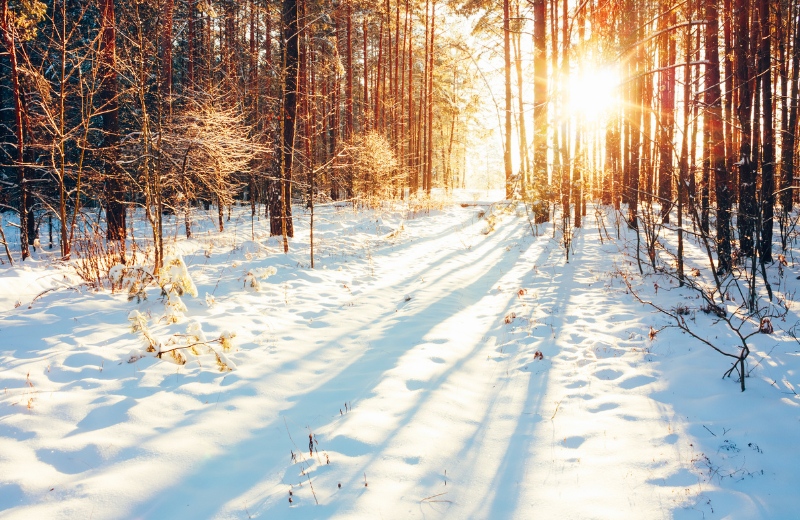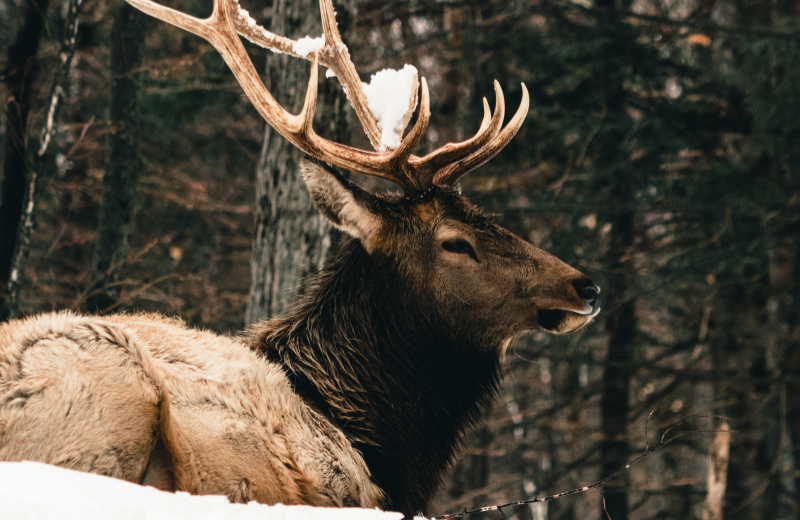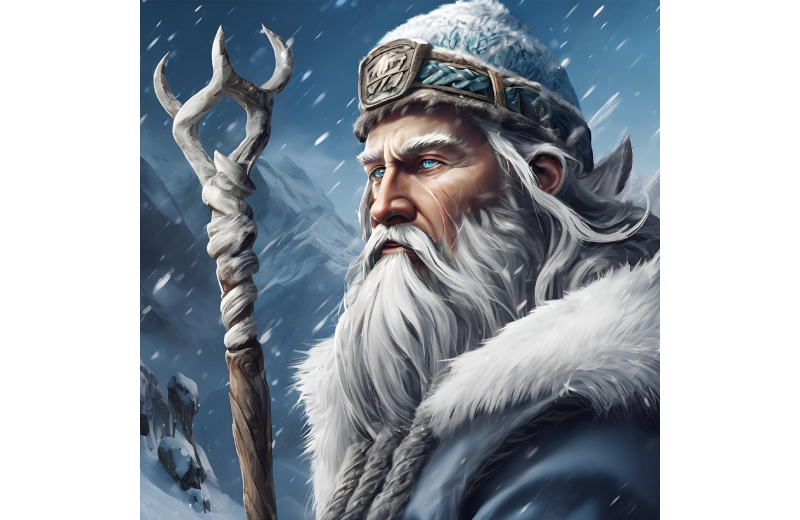If you’ve ever been curious about the lesser-known gods of Norse mythology or found yourself drawn to icy landscapes, snow-covered forests, and the silence of winter, Ullr might just be the god you’ve been looking for. While not as famous as Odin or Thor, Ullr holds an important place in the Norse pantheon; as the Norse god of winter, snow, and archery, he embodies the quiet strength and sharp focus that come with the coldest season.
Jump to:
- Who Was Ullr in Norse Mythology?
- Ullr’s Myths
- The Role of Ullr in Norse Storytelling
- What Powers Did Ullr Possess?
- Symbols Associated with Ullr
- Ullr’s Lineage and Connections
- Why Is Ullr Special?
- Ullr in Modern Culture
- Ullr’s Worship and Legacy
- Frequently Asked Questions About Ullr
- Study Norse Mythology for £29
Recommended for you!
Best SellersWho Was Ullr in Norse Mythology?
In Norse mythology, Ullr (pronounced “Ool-er”) is the god of winter, snow, archery, hunting, and skiing. Often associated with the wild, untamed forces of nature, Ullr was believed to rule over the colder months and bring skill and precision to those who honoured him.
Though Ullr is not mentioned as frequently as some of the other gods, he was deeply respected. Ancient texts describe him as a great warrior, an expert marksman, and someone whose presence could bring order to the natural world—even in the harshest conditions.
The name “Ullr” likely stems from an Old Norse word meaning “glory” or “splendour,” which hints at the reverence he once commanded.
Ullr’s Myths

Unlike other gods, Ullr doesn’t appear often in surviving myths. Much of what we know about him comes from fragments in old poems and sagas, where he’s referenced with great respect. He’s known to have once ruled over Asgard in Odin’s absence, a testament to his wisdom and leadership.
Some stories suggest Ullr had the power to protect and bless warriors, guiding them through dangerous terrain or ensuring success in hunts. Others hint at his magical abilities, possibly linked to winter spells or runes, though these are mostly speculative based on his status as a snow god and hunter.
One of the clearest signs of his importance lies in place names. Several locations in Scandinavia are named after Ullr, suggesting he was once widely worshipped, even if the stories about him didn’t survive as well as others.
The Role of Ullr in Norse Storytelling
Ullr’s role in Norse storytelling may not be detailed in dramatic epics, but his character still plays a symbolic part. As the god of winter in Norse mythology, Ullr represents the endurance, patience, and sharp skills needed to survive the cold months.
While Odin might symbolise wisdom and Thor raw power, Ullr is about balance and precision—quiet mastery rather than brute force. He reflects the importance of preparation and skill, especially when dealing with the unpredictability of nature.
In some accounts, Ullr is also considered a divine judge, someone fair and just. This quality, combined with his martial and hunting skills, adds depth to his image as a calm and controlled protector.
What Powers Did Ullr Possess?

Ullr’s powers were primarily physical and elemental. He was known for:
- Unmatched Archery Skills: Ullr was the best archer among the Norse gods. His aim was perfect, symbolising focus and precision.
- Skiing and Hunting Abilities: He could move swiftly across snow-covered lands using skis or snowshoes, making him the perfect hunter during winter. This is why he's also referred to as the god of snow and ice.
- Winter Mastery: As the Norse god of winter, Ullr controlled the season’s harsh elements. He wasn’t just surviving the cold—he ruled it.
- Stealth and Movement: His ability to move silently through forests and snow made him a patron of hunters and warriors who relied on stealth.
While Ullr wasn’t the most vocal or dramatic god, his powers spoke volumes. He embodied the strength that comes from patience, silence, and mastery.
Symbols Associated with Ullr

Ullr’s symbols reflect his connection to nature and survival in cold climates. These include:
- Bow and Arrow: Representing skill, focus, and accuracy, the bow is Ullr’s most iconic weapon. The exact name of Ullr’s bow hasn’t survived history, but it’s consistently described as mighty and dependable.
- Skis or Snowshoes: He’s often depicted skiing through the forests, symbolising agility and harmony with winter.
- The Shield: In some depictions, Ullr uses a shield not only for protection but also as a magical item—possibly even riding it like a sled.
- Winter Animals: Creatures like wolves or elk may also be associated with Ullr, representing his presence in the wild.
Colours associated with Ullr tend to be those of winter—whites, icy blues, greys, and silvers.
Ullr’s Lineage and Connections
Ullr’s place in Norse mythology is shaped by his notable heritage and subtle links to powerful deities:
- He is the son of Sif, the golden-haired goddess associated with earth and fertility.
- While Ullr’s father is never clearly identified in surviving texts, his maternal connection places him within a prominent divine lineage.
- Through Sif’s marriage to Thor, Ullr becomes Thor’s stepson, creating a link to one of the most famous gods in the Norse pantheon.
These relationships place Ullr in the sphere of influential mythological figures while allowing him to retain a distinct and somewhat independent identity. His connection to both warrior gods and nature-associated deities reflects his dual role as a protector and survivalist.
Why Is Ullr Special?

Ullr stands out because he represents a different kind of power. In a pantheon full of war gods, tricksters, and thunder-wielders, Ullr offers something quieter—competence, clarity, and calm. He’s the snow god, the god of winter Norse legends turned to for safety, skill, and survival when the days grew dark.
Ullr also symbolises the idea of being prepared. When everything slows down in winter, and survival becomes more difficult, Ullr’s presence reminds us of the strength found in patience, planning, and precision.
Ullr in Modern Culture
Ullr continues to leave a mark in modern culture—especially among winter sports enthusiasts and spiritual practitioners. He features in books, games, and folklore-inspired media, often portrayed as a stoic, skilled warrior or guardian of winter.
Ski resorts and mountain towns sometimes honour him as a snow god through events like the Feast of Ullr, where communities gather to celebrate snowfall with bonfires, skiing, and ritual offerings. In these settings, Ullr is called upon as the god of snow and ice, believed to bring fresh powder and protect those braving the slopes.
He has also found quiet reverence among modern pagans and Heathens, who view him as the patron of archers, hunters, and those who feel spiritually drawn to winter. For many, Ullr is a symbol of quiet endurance, skill, and harmony with nature.
Ullr’s Worship and Legacy
Honouring Ullr in the modern day often involves connecting with nature in meaningful, respectful ways. Offerings can be simple yet thoughtful—items like pine branches, antlers, handmade arrows, or even snow itself are left as tokens of appreciation. Walking quietly through snow-covered forests, practising archery with focus, or meditating by a frozen lake are acts that align closely with Ullr’s energy.
There’s no set ritual to follow. People who wish to connect with him might light a candle on a cold night, sip spiced wine or mead, and speak from the heart. The quiet, personal nature of these gestures reflects the kind of god Ullr is—one who listens in stillness and rewards genuine effort.
Among symbolic drinks, mead or mulled wine are often chosen for their warming qualities and historical links to Norse culture. These drinks are seen as fitting tributes, particularly in ceremonies or moments of quiet reflection.
The Feast of Ullr, where skiing, snow games, and community gatherings come together, is another way his spirit is celebrated. These festivities reflect the joy of winter and the protective presence of the god of snow, who is believed to bless participants with fresh powder and safe passage through the season.
Recommended for you!
Best SellersFrequently Asked Questions About Ullr
What was Ullr the god of?
He was the god of snow and winter, archery, hunting, and skiing in Norse mythology. As a winter deity, Ullr was often called upon for guidance in survival, precision, and protection during the harshest months.
How is Ullr pronounced?
It’s pronounced “Ool-er” (the double L is soft, almost silent). Saying his name aloud in rituals or prayers is believed by some to invite his presence and blessings.
What is the female version of Ullr?
There’s no direct female counterpart in myth, but some might see connections to Skadi, a goddess of winter, hunting, and skiing. Skadi, like Ullr, is closely associated with snow-covered landscapes and the resilience needed to thrive in them.
What does Ullr represent?
Ullr represents control, discipline, mastery over winter, survival skills, and respect for nature. He is a symbol of self-reliance and the quiet strength that comes from being in tune with the natural world.
How do I make an offering to Ullr?
Bring nature-based items like pinecones, snow, or arrows to a quiet place. Speak your intention clearly and respectfully. Many choose winter solstice or snow-filled days as especially meaningful times to honour him.
Study Norse Mythology for £29
Norse mythology is full of fascinating gods, legends, and deeper meanings waiting to be explored. If you’re fascinated by Ullr and Norse mythology, why not take your knowledge further? At Centre of Excellence, you can enrol in the Norse Mythology Diploma Course for just £29! Learn about the gods, myths, and legends in greater depth and explore the rich history of the Vikings.













